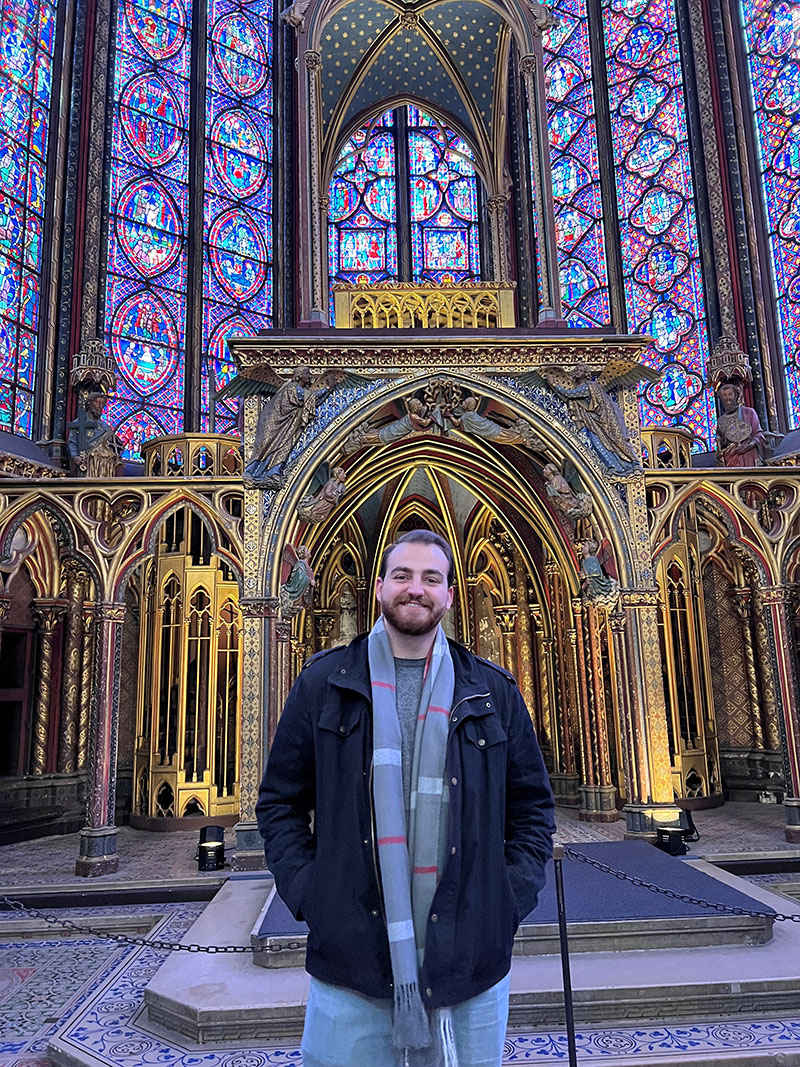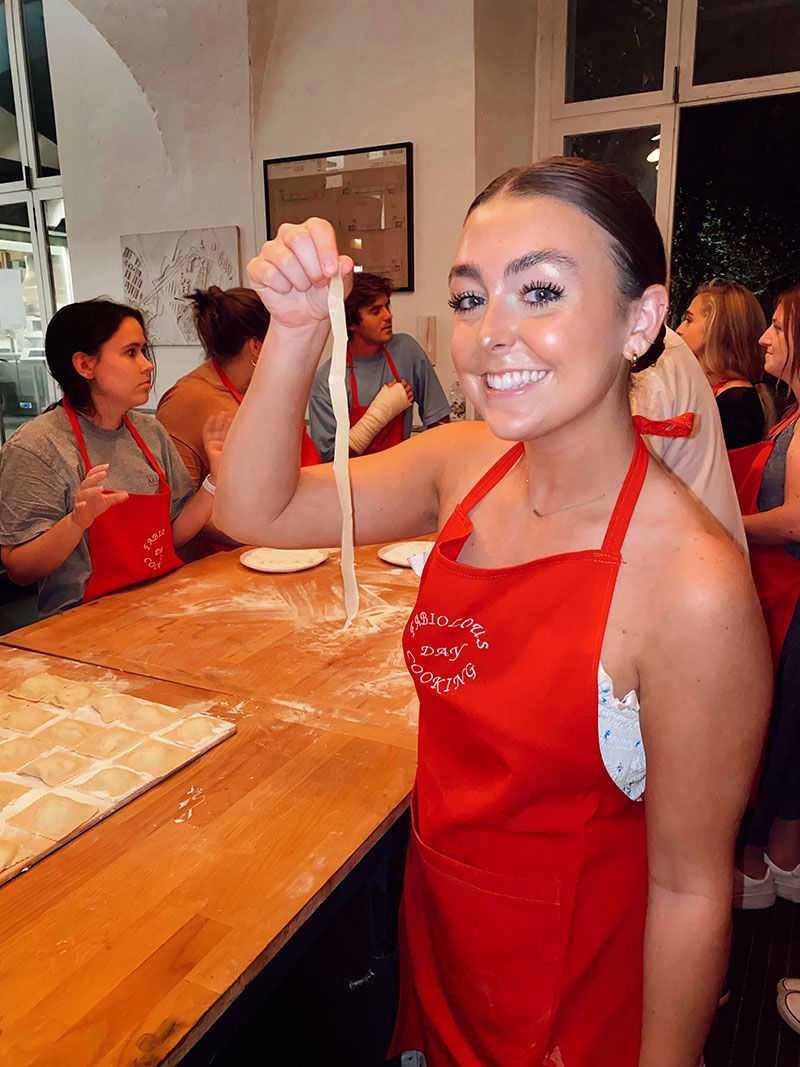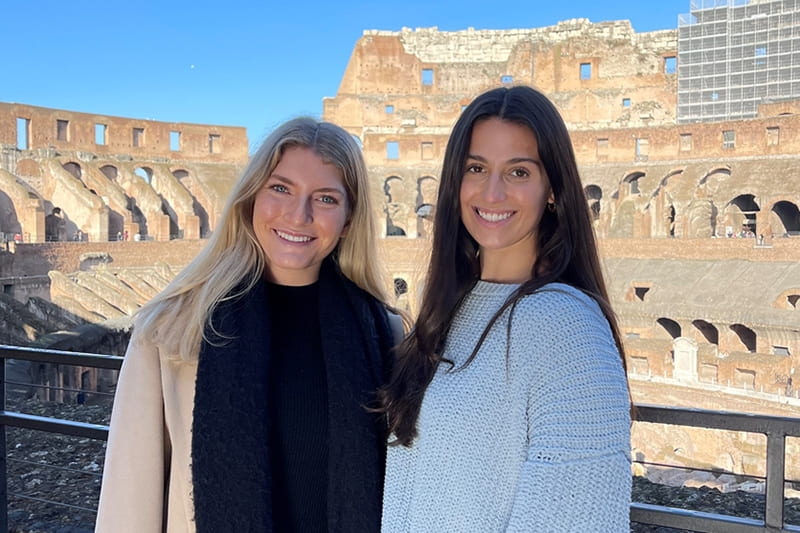A record number of students — more than 270 this past academic year — traveled to the Eternal City for the transformational experiences of the university’s Rome Center. Their educational and cultural experiences have defined the center since its establishment in 1989.
As the center continues to expand its offerings to students across the U of A campus as a part of the Graduate School and International Education, it is fast becoming a hub of international engagement in Europe. A greater number of students are afforded the opportunity to study and live there — and be forever changed in the process.
The Most Connected I’ve Ever Felt With History
William Bellamy was enjoying his first week in Rome, walking down the sidewalk with his friends in search of a place to eat lunch when they rounded the corner to see a jaw-dropping sight — the Pantheon. Bellamy had studied it for years during his architecture classes in the Fay Jones School of Architecture and Design, and now he had stumbled across it by accident.
“It was so powerful in that moment,” Bellamy said. “Integrated into the fabric of the city are these monuments. They’re so interwoven and very indicative of how our time in Rome was. You’re just living among these absolute monuments of architecture.”
 U of A architecture student William Bellamy at the Sainte Chapelle, which dates to the 13th century. |
Bellamy, a fifth-year senior, studied in Rome during the spring semester, where he took courses on Roman architecture and sketching. Complementing those was a studio course in which Bellamy worked with other students to analyze an area of the city and design a building that addressed the needs of that area.
Through the experience, Bellamy discovered a “fascination to learn.”
“You would learn about it Tuesday and then go visit it on Wednesday,” he said. “It was just such a wonder. When you’re standing in front of the Colosseum, and you’re seeing how massive and old it is, it gives you a new appreciation.”
Bellamy was an experienced international traveler, having visited Germany, Latvia and New Zealand prior to his foray into Italy. But the four-month stint in Rome marked his first time living abroad without parents — an independence that proved edifying.
“It was just like growing up in like the best way. You’re in this new place, and you really want to make the most of it. No one is going to do it for you,” he said. “And I’ve learned so much about architecture — the professors are so passionate about what they’re doing, and that was completely inspiring.”
When Bellamy thinks back to Rome, that first time he approached the Pantheon is a moment he’ll never forget.
“It’s the most connected I have ever felt with history,” he said. “The person who designed this has been dead for thousands of years, but millions of people see it each year. It was motivation to try and leave a mark that I’m proud of.”
You Get on That Plane, and Your Life Is Forever Changed
When Abbey Suess asked alumni what their biggest regret was in college, “almost 99 percent” of them had the same response.
“They said they wish they would’ve studied abroad or taken the leap and gotten into it,” Suess said. “I always had studying abroad in the back of my mind and knew I wanted to do it, but that solidified my desire to see what opportunities were there for me.”
One opportunity in particular spoke to Suess, a nursing major in the College of Education and Health Professions. It was a fall semester opportunity to study abroad in the Rome Center. There, Suess took a full 15-hour course load including classes in pediatrics and obstetrics, caring for geriatric patients and a health promotion class that culminated in a personal project about how to promote health and wellbeing to different age groups.
 Nursing student Abbey Suess joins classmates during an excursion into the world of Italian cooking. |
“Academics in Rome were not easy,” she said. “A lot of people see the pictures and stories and ask, ‘Did you even go to school?’ And yes, we definitely went to school.”
“There were days we would … study all day and then take a test,” she continued. “That experience was fabulous, because it was a small group of students with a professor that we adore. So we were able to ask more questions and build a relationship with these professors to where we were comfortable asking harder questions and getting feedback.”
Suess was also able to work in Gemelli Hospital, one of the largest private hospitals in Europe, and shadow healthcare givers — an experience that opened her eyes to an approach to healthcare that is different from the traditional approach in the United States.
“Typically the first thing we do in the U.S. when they’re sick or ill, we typically like to go ahead and prescribe them a medication or some sort of ointment or cream or pill or something in hopes of treating that illness,” she said. “In Italy, they’re more nontraditional and homeopathic. They don’t prescribe right off the bat. They go through your diet choices and routine instead of the trial and error with medication.”
Her four months in Rome became more than just an academic experience.
“Oh my gosh, the Rome program completely changed my life,” she said. “It changed who I am, how I view the world — I came back a completely different person. I just feel so much more myself. I’m just a better person in society — a better, well-rounded human being.”
“Anybody who thinks about studying abroad should take that step,” she said. “You get on that plane, and your life is forever changed. It’s the most amazing experience, and I can’t recommend it enough.”
It’s Just Problem Solving
Addison Pummill didn’t always plan to earn a global studies minor. A computer information systems major in the Sam M. Walton College of Business, Pummill wasn’t sure of what study abroad opportunity she wanted to pursue. But after finding out about the opportunity to earn a global studies minor from the Rome Center during the spring semester, Pummill jumped on the chance.
“The Rome Center fell in my lap as the perfect opportunity,” she said.
During her semester in Rome, she took courses on global studies — an introduction course and a course on global changemakers — as well as an ethics course on good and evil that drew from the rich traditions of Greek and Italian philosophy.
“Learning about those things and the having the opportunity to apply them immediately in those real settings was an incredible academic experience,” she said. “Normally, you’re learning from books. In Rome, you’re actually getting to go do those things.”
During her time in Rome, Pummill had to navigate much of the city on her own without hand-holding from parents or faculty. It was nerve-wracking, but it helped her hone her problem-solving skills.
“That’s probably the best term to use — it’s just problem solving,” she said. “There are so many issues and problems that come up every day and you just have to work through them because you live there. You can’t just leave.”
Not only that, but the Rome experience taught Pummill to make the most of her time — whether abroad or here in Fayetteville.
“Trying to manage seeing all the sights in Rome and getting acclimated with my surroundings, I think that time management and understanding the value of time was transformative,” she said. “When I got back, everything slowed down, but I was still wanting to do stuff in Fayetteville.”
Pummill had only been back from Rome for a little over a month before talking about it, but the experience was already paying dividends. It helped her secure an internship with Affirma Consulting, a business and technology consulting firm.
“It’s been really helpful because I can point to, besides the amazing experiences, I can point to that minor and say I gained this certification by my university that I’m studying globally,” she said. “It’s only going to help me as more businesses are looking to expand and go global.”
For more information on the Rome Center, visit its website.


